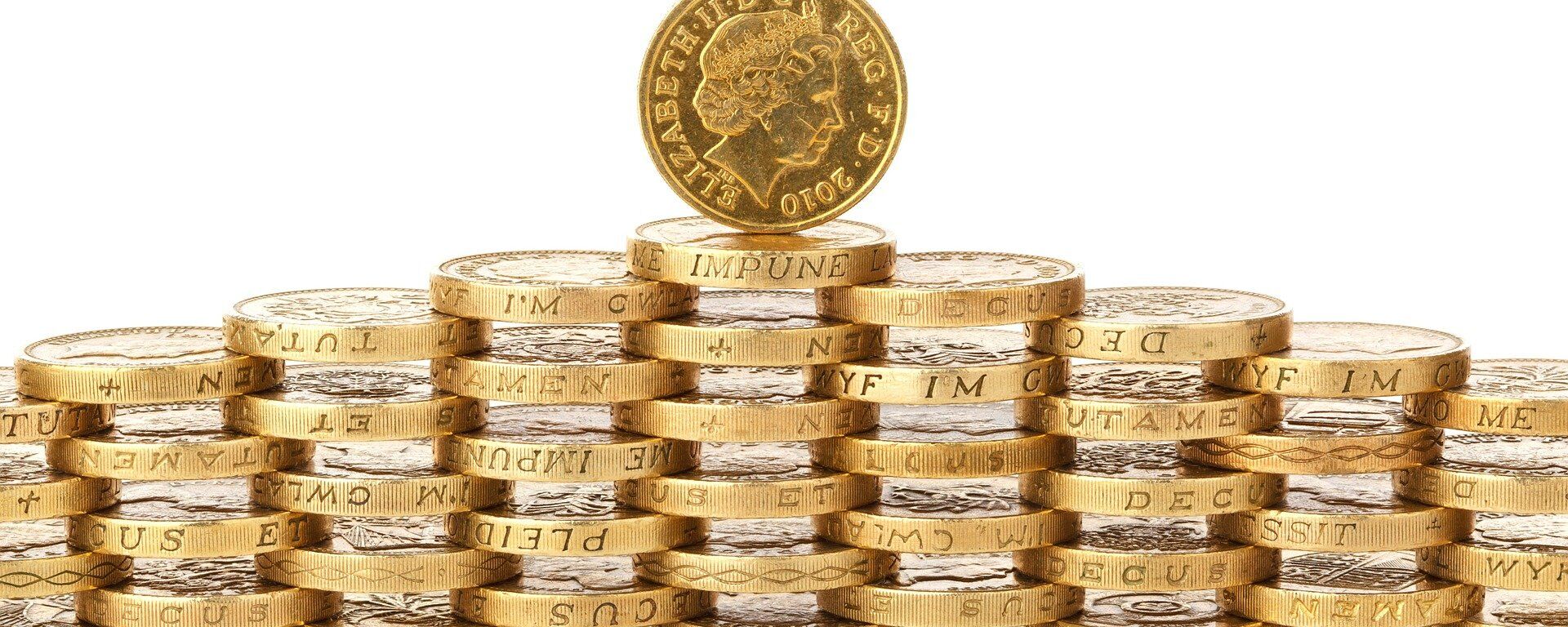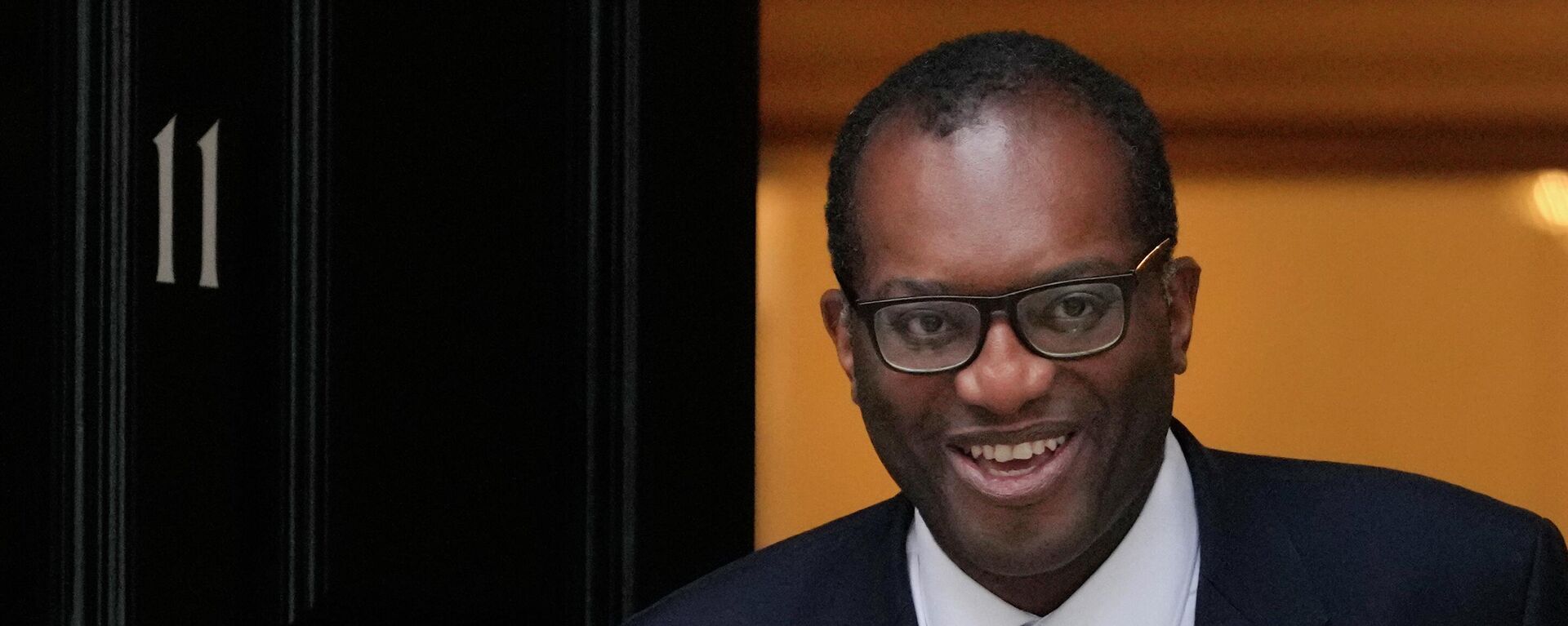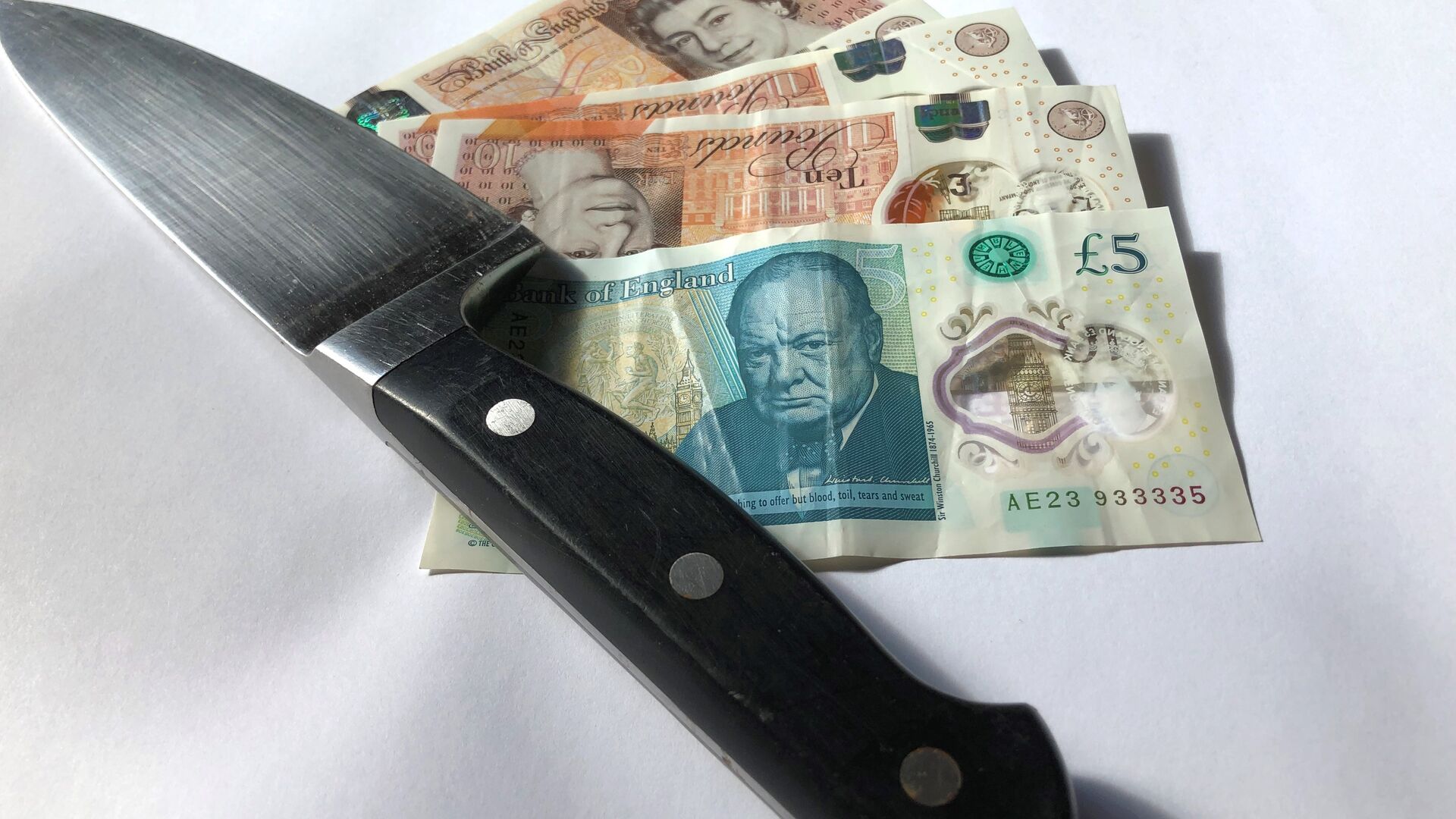https://sputnikglobe.com/20220926/absolutely-hammered-uk-pound-slides-to-its-lowest-level-against-us-dollar-since-1971-1101218611.html
‘Absolutely Hammered’: UK Pound Slides to Its Lowest Level Against US Dollar Since 1971
‘Absolutely Hammered’: UK Pound Slides to Its Lowest Level Against US Dollar Since 1971
Sputnik International
Last week, UK Chancellor of the Exchequer Kwasi Kwarteng announced the country’s new mini-budget, unveiling massive tax cuts funded by huge increases in... 26.09.2022, Sputnik International
2022-09-26T06:02+0000
2022-09-26T06:02+0000
2023-05-28T15:21+0000
world
kwasi kwarteng
liz truss
government
pound
economy
budget
united kingdom (uk)
https://cdn1.img.sputnikglobe.com/img/107312/51/1073125141_0:378:4032:2646_1920x0_80_0_0_0938cd301676575757ea7ef3969f1b22.jpg
The UK pound plunged to its lowest level against the US dollar since the British currency went decimal in 1971.In early Asia-Pacific trade on Monday, the sterling fell by more than 4% to $1.0327 before it regained some ground to about $1.05, extending Friday's 3.61% drop.According to him, “they're saying this is not sustainable, when you've got deteriorating growth and a twin deficit.”The developments come after UK Chancellor Kwasi Kwarteng on Friday announced the government’s mini-budget, aimed at resolving the cost of living crisis and boosting economic growth.Kwarteng vowed to raise gross domestic product (GDP) growth to 2.5% and proposed more than £411 billion ($446 billion) in extra borrowing over five years.The package of measures stipulate spending £60 billion ($65 billion) in the six months following October 2022 to reduce energy bills for UK households and businesses. The basic income tax rate will be slashed to 19% from 20%, while a planned corporate tax hike to 25% will be reversed, with businesses continuing to pay a rate of 19%. The 45% income tax rate paid by those earning over £150,000 ($158,000) per year will be reduced to 40%. The cap on bankers’ bonuses will be abolished, and alcohol duties will be frozen. Kwarteng also announced a series of supply-side measures, and a reform of planning rules with the creation of low-tax investment zones on top of this.The chancellor's announcement of the mini-budget was followed by a turmoil in UK financial markets, with sterling plummeting more than three percent against the greenback to $1.085 - a level last seen 37 years ago.This came as Shadow Chancellor Rachel Reeves dubbed the mini-budget a “plan to reward the already wealthy”, arguing that Prime Minister Liz Truss and Chancellor Kwarteng “are like two desperate gamblers in a casino chasing a losing run.”In the Commons, only a few Conservative MPs gave Kwarteng full support, while some voiced alarm over aspects of the new economic plan.They included Julian Smith, a former Tory chief whip, who claimed that “the huge tax cut for the very rich at a time of national crisis and real fear and anxiety amongst low-income workers and citizens is wrong.”In a separate development last week, The Telegraph reported that Tory backbenchers are ready to rebel against Truss if the pound falls below the dollar. They reportedly said that they will “hit the nuclear button” and vote against the PM’s tax cuts if the pound continues to plummet.Another unnamed source told the newspaper that Kwarteng’s budget was “much more expansive than what people were expecting” and they were concerned about the markets being sent into a “tailspin” on Friday.
https://sputnikglobe.com/20220908/british-pound-sterling-nosedives-to-1985-low-against-dollar-amid-fears-of-uk-recession-1100529322.html
https://sputnikglobe.com/20220923/british-chancellor-unveils-mini-budget-to-tackle-runaway-inflation-1101117219.html
united kingdom (uk)
Sputnik International
feedback@sputniknews.com
+74956456601
MIA „Rosiya Segodnya“
2022
Oleg Burunov
https://cdn1.img.sputnikglobe.com/img/07e4/09/0b/1080424846_0:0:2048:2048_100x100_80_0_0_3d7b461f8a98586fa3fe739930816aea.jpg
Oleg Burunov
https://cdn1.img.sputnikglobe.com/img/07e4/09/0b/1080424846_0:0:2048:2048_100x100_80_0_0_3d7b461f8a98586fa3fe739930816aea.jpg
News
en_EN
Sputnik International
feedback@sputniknews.com
+74956456601
MIA „Rosiya Segodnya“
Sputnik International
feedback@sputniknews.com
+74956456601
MIA „Rosiya Segodnya“
Oleg Burunov
https://cdn1.img.sputnikglobe.com/img/07e4/09/0b/1080424846_0:0:2048:2048_100x100_80_0_0_3d7b461f8a98586fa3fe739930816aea.jpg
kwasi kwarteng, liz truss, government, pound, economy, budget, united kingdom (uk)
kwasi kwarteng, liz truss, government, pound, economy, budget, united kingdom (uk)
‘Absolutely Hammered’: UK Pound Slides to Its Lowest Level Against US Dollar Since 1971
06:02 GMT 26.09.2022 (Updated: 15:21 GMT 28.05.2023) Last week, UK Chancellor of the Exchequer Kwasi Kwarteng announced the country’s new mini-budget, unveiling massive tax cuts funded by huge increases in borrowing. The markets reacted negatively to the announcement, with the pound and British government bonds sliding sharply.
The UK pound plunged to its lowest level against the US dollar since the British currency went decimal in 1971.
In early Asia-Pacific trade on Monday, the sterling fell by more than 4% to $1.0327 before it regained some ground to about $1.05, extending Friday's 3.61% drop.
Chris Weston, head of research at the brokerage firm Pepperstone, was cited by the Daily Mail as saying that “sterling is getting absolutely hammered” and that “investors are searching out a response from the Bank of England.”
According to him, “they're saying this is not sustainable, when you've got deteriorating growth and a twin deficit.”
He was echoed by Marc Chandler, chief market strategist at Bannockburn Global Forex, who described the pound’s record plunge as “incredible”, suggesting that the Bank of England may hold an emergency meeting to deal with the issue.
The developments come after
UK Chancellor Kwasi Kwarteng on Friday announced the government’s mini-budget, aimed at resolving the cost of living crisis and boosting economic growth.

8 September 2022, 07:06 GMT
Kwarteng vowed to raise gross domestic product (GDP) growth to 2.5% and proposed more than £411 billion ($446 billion) in extra borrowing over five years.
The package of measures stipulate spending £60 billion ($65 billion) in the six months following October 2022 to reduce energy bills for UK households and businesses. The basic income tax rate will be slashed to 19% from 20%, while a planned corporate tax hike to 25% will be reversed, with businesses continuing to pay a rate of 19%. The 45% income tax rate paid by those earning over £150,000 ($158,000) per year will be reduced to 40%. The cap on bankers’ bonuses will be abolished, and alcohol duties will be frozen. Kwarteng also announced a series of supply-side measures, and a reform of planning rules with the creation of low-tax investment zones on top of this.
The chancellor's announcement of the mini-budget was followed by a turmoil in UK financial markets, with sterling plummeting more than three percent against the greenback to $1.085 - a level last seen 37 years ago.
This came as Shadow Chancellor Rachel Reeves dubbed the mini-budget a “plan to reward the already wealthy”, arguing that
Prime Minister Liz Truss and Chancellor Kwarteng “are like two desperate gamblers in a casino chasing a losing run.”
“The argument peddled by the Chancellor isn’t a great new idea or a gamechanger, as the minister said, as much as they’d like us to think so. What this plan adds up to is to keep corporation tax where it is today, and take national insurance contributions back to where they were in March. Some new plan,” Reeves told the House of the Commons late last week.
In the Commons, only a few Conservative MPs gave Kwarteng full support, while some voiced alarm over aspects of the new economic plan.
They included Julian Smith, a former Tory chief whip, who claimed that “the huge tax cut for the very rich at a time of national crisis and real fear and anxiety amongst low-income workers and citizens is wrong.”

23 September 2022, 10:37 GMT
In a separate development last week, The Telegraph reported that Tory backbenchers are ready to rebel against Truss if the pound falls below the dollar. They reportedly said that they will “hit the nuclear button” and vote against the PM’s tax cuts if the pound continues to plummet.
The Telegraph cited an unnamed Tory MP as saying that “my biggest anxiety is that I’m going to wake up on Monday and it’s going to be Black Monday”.
Another unnamed source told the newspaper that Kwarteng’s budget was “much more expansive than what people were expecting” and they were concerned about the markets being sent into a “tailspin” on Friday.







